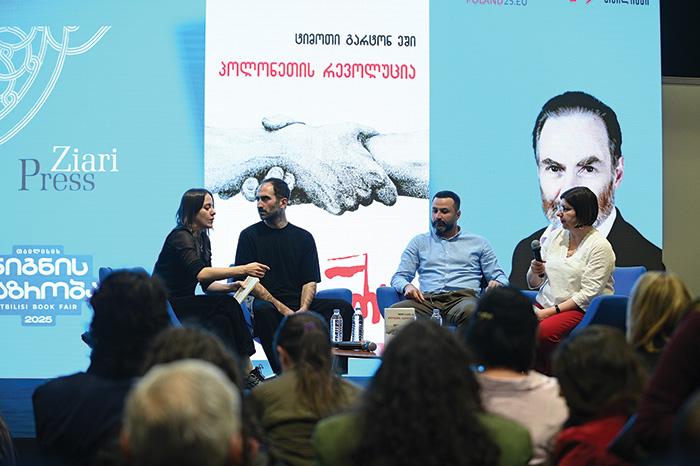Tbilisi Book Fair celebrates Georgia’s passion for print
The written word is far from fading in Georgia’s capital—in fact, it’s flourishing. At least, that’s what the numbers suggest, with more than 50,000 people visiting the 2025 Tbilisi Book Fair over just four days in April. Held at Expo Georgia, the event blended literature, culture, and community in a celebration of Georgia’s enduring love for books.
With two stages of programming, pop-up shops, interactive spaces, and a diverse offering of genres and publishers, the fair was more than a market—it was a statement. This year’s fair marked the first major initiative of the newly established Georgian Book Association.
The association was founded by members who split from a previous book industry group. Determined to carry forward their shared values, independent publishers, literary businesses, and bookstores came together to create a new association. “This fair is our first step as a new association, and it serves as a sort of a statement that we’re still functional and can self-organize,” said Nata Dzvelishvili, the group’s current head. “We felt a responsibility to readers to show our commitment to them, since we wouldn’t be present at a [similar event] in May—to show them that we were still there for them.”

With the support of partners like TBC, UNFPA, Veli Store, and the Polish Institute in Tbilisi, the new association curated a vibrant event aimed at inclusivity and industry resilience.
For those who couldn’t attend in person, Veli Store offered a digital version of the fair, making featured books available online through discounts and exclusive offers.
Books, community, and collaboration
The fair welcomed all literary businesses, giving small and independent publishers the opportunity to stand alongside industry veterans. Among them was Books in Vake, a boutique English-language bookstore that works with around 15 foreign publishers. Their collection spans a wide range of topics – from philosophy and art to fashion, photography, and travel – and is regularly updated every few months.

“We’ve already struck deals with a few private schools to provide them with our books,” says Books in Vake’s Mariam Kikacheishvili, speaking of the valuable connections the bookstore made during the event. “We believe the event turned out exceptionally well—it exceeded expectations in terms of visitor turnout.”
Beyond book sales, the fair offered curated programming across two stages. The main stage featured author talks, book debuts, and panels, while a second stage—curated by the group Actors for Literature—hosted readings of book reviews penned by recently incarcerated political prisoners. There were also food courts for guests to relax and refresh.
Along with this programming, the festival featured a dedicated media space sponsored by the Polish Institute to spotlight the role of free press in Georgia. Its mission was to show solidarity and support to Georgian media, which continues to guard freedom of expression and stay true to its mission to inform the public in these tumultuous times. “Without the online media and Georgian journalists, we wouldn’t even be anywhere close to where we are today,” says Association Head Nata Dzvelishvili, who also serves as director of the Georgian media outlet Indigo.

Gen Z turns the page
Despite ongoing debates about whether younger generations still enjoy the written word, the Tbilisi Book Fair told a different story. According to event organizers, 38% of attendees were between the ages of 20 and 29, while another 30% were under 20. UNFPA even set up a daycare-style activity zone so parents could browse while their children played.
“We’re constantly being told that younger generations have lost interest in reading, but I’d say on the contrary—many young visitors were genuinely curious and eager to explore the selection,” says Books of Vake’s Kikacheishvili.
This data mirrors global trends. Gen-Z is helping to drive a revival in print publishing and independent bookstores, transforming literary culture in a digital age. With the World Economic Forum reporting that 68% of Gen-Z readers prefer print over e-books, U.S. book sales soared to 843 million units in 2021 and 789 million in 2022. Driven by their love of the tactile experience as well social media—particularly #BookTok—bookstore visits have become a cultural trend, with 49% of Gen-Z readers making purchases at physical bookstores.
Despite concerns that two competing book events could confuse audiences—with another international book fair traditionally held in May—the April timing did little to dampen enthusiasm. A focused communications push helped attract not only locals but visitors from across the country. “With under a month to prepare, we unleashed a comprehensive social media campaign,” said Nini Tabagari, the association’s head of communications.
Looking ahead, organizers plan to expand the fair’s footprint at Expo Georgia and take the event on the road to other regions of Georgia. In the near term, a smaller “Freedom Library” pop-up will appear at the Tbilisi Open Air music festival—bringing books and the values of free expression into yet another cultural space.
